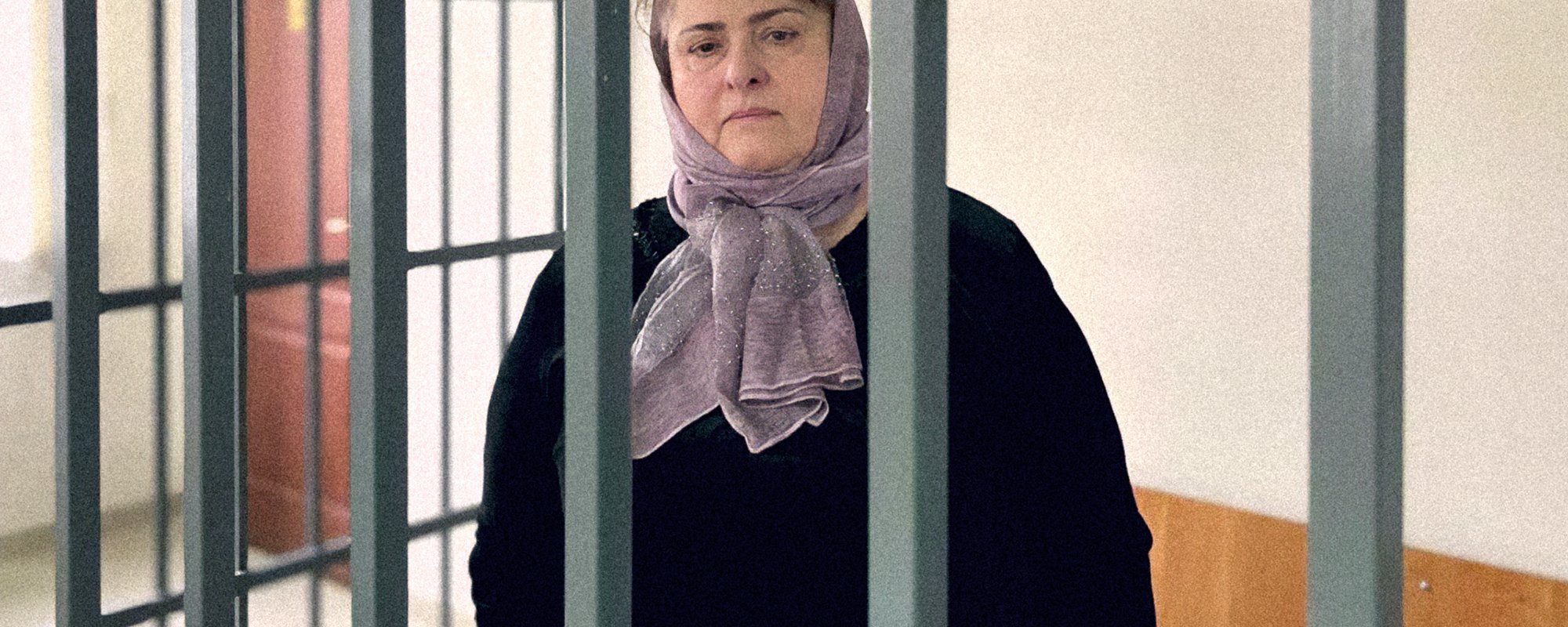Pressure on activists’ family members, torture in a detention center, and the consequences of #FreeNavalny June 4th protests — OVD-Info covers the main news for the month of June in our report on political repressions.
Prosecution for anti-war stance


The death of Anatoly Berezikov, an activist from Rostov, in a detention centre was among the most significant events of the month. Berezikov has been detained since May 10th: on that day, his apartment was raided and the activist was detained presumably for spreading anti-war leaflets in the city. Courts arrested Berezikov three times; he told human rights defenders that police threatened and tortured him. After Berezikov’s death, the Investigative Committee reported that it opened a criminal case under the article for incitement to suicide. However, in relation to this case, it was the offices of the activist’s defense attorneys that were searched instead of employees of the detention centre.
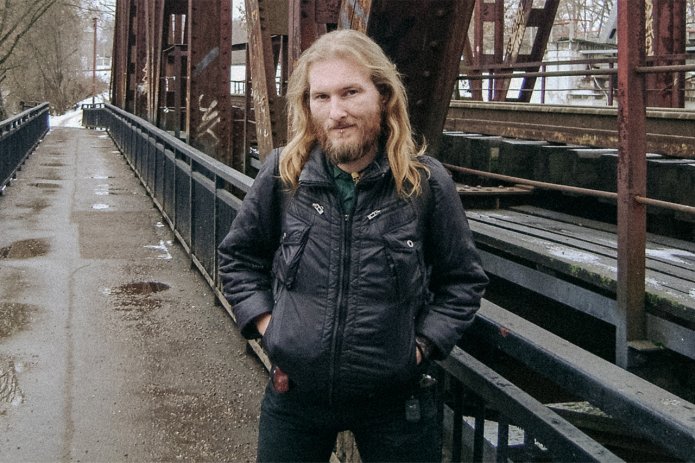
In June, Crimean performance artist Bogdan Ziza was sentenced to 15 years in prison for pouring yellow and blue paint on the front of Yevpatoria city administration building and for throwing a Molotov cocktail at it. The day before the sentence, Ziza declared a hunger strike demanding freedom for political prisoners. A 19-year-old from Yaroslavl, Valeriya Zotova, was sentenced to six years in prison for an attempted arson of the office where aid for the Russian military had been collected. Zotova’s mother, Svetlana was criminally charged for the justification of terrorism. Human rights defenders pointed out that both cases have signs of being fabricated.
OVD-Info regularly updates infographics about the people criminally prosecuted for their anti-war stance. You can learn about the development of anti-war repressions from May 22 through June 21 of this year in our Wartime Repressions Report.
Pressure on Family Members
Family members of activists prosecuted for political reasons often encounter violation of their own rights; sometimes administrative and criminal charges are brought against them too. Such measures are often used to put pressure on the activists.
In June, a 96-year-old mother of a defendant in the “anti-war case” was transferred under state custody. Evgeniya Baryshnikova is paralyzed and needs round-the-clock care. In June, her son, Igor Baryshnikov, who took care of her, was sentenced to 7.5 years in prison for spreading “fake news” about the Russian army; he himself has a suspected cancer condition. OVD-Info tells the story of this family in the article “This sentence will kill them both.”
Moscow-region activist Fedor Shchetinin reported that his parents’ house was searched, allegedly because of his connections to the “Russian Volunteer Corps.” Children of pastor Nikolai Ulitin, who was detained and charged with collaboration with an “undesirable” organization, were issued an administrative fine for participating in activities of such an organization.
Mother of Chechen activists, Zarema Mousaeva, was sentenced to five and a half years in prison for fraud and violence towards the police. Shortly before that, the woman was hospitalised: while in detention, her eyesight significantly worsened, and she could barely walk.
The father of Navalny’s ally Ivan Zdanov, Yuri, encountered pressure in prison: someone placed a blade in his pillow, and he was sent to a punishment cell for that.
Repressive Lawmaking
In June, the Russian Constitutional Court declared that it does not see any problems with the administrative article on “discrediting” the army and considered it compliant with the Constitution. The judges refused to consider 13 complaints filed by OVD-Info together with other human rights activists — including those from “Memorial” and “Russia Behind Bars.”
Vladimir Putin signed a law expanding the administrative article on distribution of extremist materials. It can now also be used to penalise the distribution of materials that are not included in the corresponding list. In addition, the Duma passed in its first reading bills on responsibility for aiding “foreign agents” and for participation in unregistered foreign NGOs.
“Foreign Agents” and “Undesirable Organizations”
“Foreign Agents”


“Undesirable” Organizations

In June, the General Prosecutor’s Office declared the human rights group “Agora”, “Novaya Gazeta Evropa”, the World Wildlife Fund (WWF), and the Christian organization “TCNN Covenant of Churches” “undesirable”. According to the ministry, the activities of human rights defenders, journalists and believers from these organizations “pose a threat to the constitutional order” of Russia, and the WWF prevents the development of the domestic economy.
Freedom of speech
Blockings

Russian state agencies continued to restrict access to information related to the war in Ukraine and other socially important topics. In particular, the websites and “Odnoklassniki” page of OVD-Info, the website of the St. Petersburg editorial board of “Novaya Gazeta”, as well as a service for sending appeals to deputies were blocked.
Cases of Calls to Terrorism or Extremism

In June, a military court sentenced Ruslan Ushakov, author of a telegram channel titled “Nastoyashchee prestuplenie” (“True Crime” — OVD-Info), to eight years in prison. In his posts, the man wrote about the shelling of Mariupol and the killing of civilians in Ukraine and allegedly “called for violence against Vladimir Putin.” During the trial, Ushakov said that he was tortured by electrocution after being detained.
Maria Mekhedova, a pediatrician from Blagoveshchensk, was prosecuted for justifying terrorism over a comment about the death of Vladlen Tatarsky: according to investigators, the woman wrote “I never thought I would ever be happy about this. God forgive me for this.” A case under this article was also opened against TikTok influencer Alexander Nemenok (known under the pseudonym “Petya Benzobakov” (“Peter Gas-tank” — OVD-Info), who spoke out against the war and criticized Vladimir Putin and the Russian elites.
Criminal Cases Related to the Article on the “Rehabilitation of Nazism” and Damage to Symbols
At the end of the month, the criminal case under the article on the “rehabilitation of Nazism” was initiated against the former Saint Petersburg State University assistant professor Mikhail Belousov: he allegedly “denied connections between Hitler's racial theory and the course of World War II,” and also spoke about the history of WWII being falsified. Prior to that, the professor was fired from the university because of his comment “a direct and open endorsement of Ruscism is repulsive” regarding the creation of a spontaneous memorial at the university to a student who died in the war with Ukraine.
Criminal cases under this article were also initiated in connection to a conversation between a convicted Crimean activist and a cellmate, a repost of Feminist Anti-War Resistance's publication dedicated to May 9, a picture of Adolf Hitler and some publications “discrediting Russian history” on social media.
In addition, a man was convicted in the Astrakhan region, a region in Southern Russia, for tearing down the Russian flag from a Russian court building, and in St. Petersburg a case was opened in connection to a graffiti with the word “Rashka”.
Criminal Cases Related to the Article on the “LGBT Propaganda”
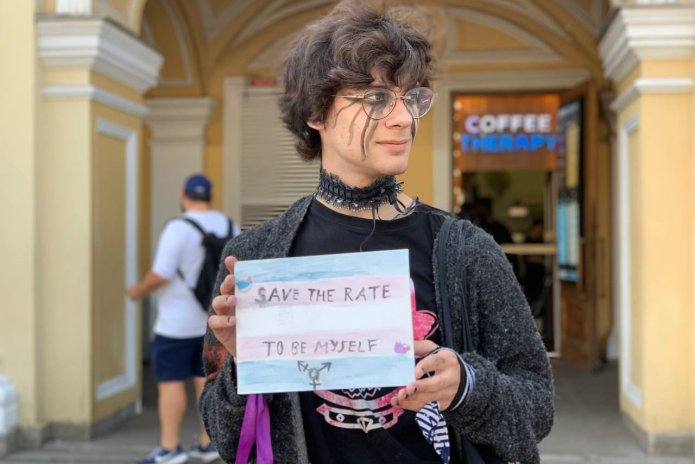
In June, OVD-Info became aware of nine reports that were drawn up against Internet providers and online movie theaters for posting “LGBT propaganda.” In particular, Russian law enforcement officers found “propaganda” in the films “Blow Dry”, “Bridget Jones’s Diary”, and “The Royal Tenenbaums”. Also under these articles, protocols were drawn up against St. Petersburg residents Alexander Sinko and Elena Ioffe, who protested against the law banning gender reassignment.
OVD-Info chronicles the pressure on LGBTQ people and the censorship caused by the “propaganda” law on a regular basis.
Freedom of Assembly
June 4 Protests

The allies of Alexei Navalny called on residents of Russian cities to protest in solidarity with the politician on his birthday — June 4. OVD-Info is aware of 136 detentions related to this rally. The project covered these stories in detail in a related chronicle.
Detentions at Rallies and their Consequences

In June 2023 detentions continued at protests in defense of the environment, political prisoners, and social problems. Bashkir environmental activist Ilsur Irnazarov was fined because more people showed up at the people’s assembly he organized than the local community centre could accommodate. The assembly was about the construction of quarries in the village of Temyasovo.
OVD-Info became aware of six detentions related to demands to release Sergei Furgal, ex-governor of Khabarovsk region, region in the far East of Russia. Ahead of the three-year anniversary of the politician’s arrest (July 9), the police in Khabarovsk began visiting activists’ houses demanding “explanations”. It is not clear what kind of explanations the law enforcers were hoping to get.
Refusals to Authorize Rallies
Over the past month, OVD-Info found out about two cases in which authorities obstructed public protests related to housing and utilities. In Yakutsk (one of the largest cities in Siberia), residents of failing buildings were not allowed to hold a rally, citing repair work in the public garden. In Bashkortostan (republic of Russia located near Ural Mountains — OVD-Info), the administration of the Tanalyk village council did not authorize a rally dedicated to the rehousing due to the mining development: officials claimed that this problem “is not an issue of local importance.”
Vitaly Koltsov's Criminal Case
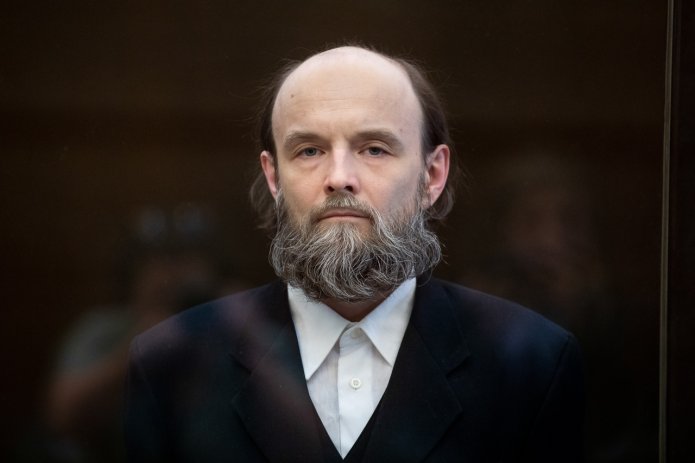
A Moscow resident Vitaly Koltsov was sentenced to six years in prison for throwing Molotov cocktails into a police van: this way he wanted to express his protest against apprehensions of participants of peaceful rallies.
Koltsov was found guilty under the articles on “an intentional damage to property” and “a use of violence that does not endanger human life or health against a representative of the authorities.”
Initially the charges did not include the article on the use of violence: when passing sentence, the court reclassified charges from an “assault on lives of law enforcement officers” to the “use of violence” against them. Prior to the verdict, the jury acquitted Koltsov under the article on assaulting the lives of law enforcement officers.
Repressions Against Journalists and Human Rights Defenders
Dmitriy Kamynin, coordinator of the “Siberia Legal” project, was sentenced to 18 years in a penal colony. «Siberia Legal» was covering beatings, torture and other cases of abuse of prisoners.
Tatyana Kotlyar, a human rights defender from Obninsk, was fined 650,000 rubles (approx. US$7000) in a case over a “rubber apartment” — she was registering people, who weren’t able to get the city registration themselves, in her apartment. It is the sixth case on these charges against Kotlyar.
Alexander Dorogov, a journalist with the “Rosderzhava” project charged with extortion and insulting a representative of authority, reported that he was beaten and robbed of his personal belongings. Unidentified people fired at Svyatoslav Khromenkov's car, a human rights advocate working with torture victims.
Pressure on Activists and Politicians
Lilia Chanysheva, ex-head of Navalny’s headquarters in the city of Ufa, was sentenced to seven and half years in a penal colony on two extremism-related charges and accusations of working for an NGO that infringes on individuals and their rights.
Besides, two more Navalny supporters became implicated in extremism cases. They are Iliya Danilov, coordinator of Navalny's headquarters in Lipetsk, and a resident of the city of Rybinsk, who according to the investigation, painted graffiti in support of the politician. Lev Gyammer, the ex-director of Navalny's headquarters in Krasnodar, said that law enforcement operatives started sending him messages on behalf of his mother who had died several years ago.
Moscow activist Dmitry Pimenov is facing charges of violence against a representative of authority. The young man pepper-sprayed a police officer in plainclothes who was trying to enter his apartment. Evgeny Tokarev, an activist from the city of Shakhty, became a defendant in a case of false denunciation after he reported being beaten by a police officer.
Activist Ulker Gashimova was placed in a pre-trial detention centre in Makhachkala. She was detained on her way to Serbia. Details of this case remain unknown.
“Extremist Organizations”
In June, law enforcement officers conducted searches in Jehovah’s Witnesses homes in Komsomolsk-on-Amur and Bryansk. A new criminal case was opened against believer Dmitriy Terebilov who is already serving a sentence for his religious beliefs: he had answered his inmate’s questions about Jehovah’s Witnesses while behind bars. Six more Jehovah’s Witnesses from Sochi, Kovrov and Tynda were sentenced to prison terms in June.
Repressions on the Territory of Annexed Crimea
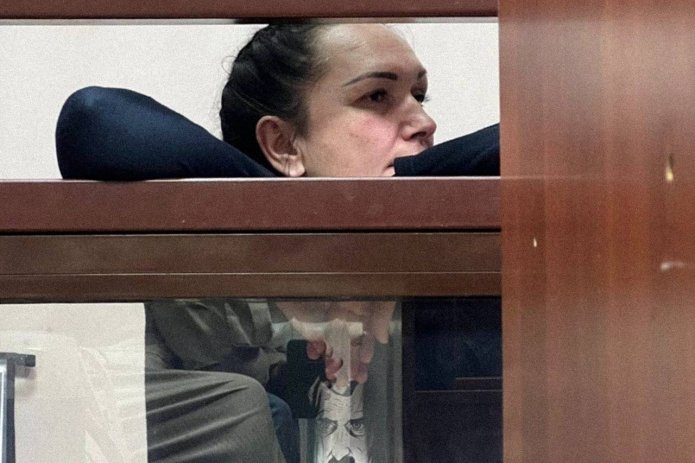
In June, Crimean Tatar activist Ansar Osmanov was sentenced to 20 years in prison in the case of the Islamist party Hizb ut-Tahrir.
Activist Irina Danilovich, who was previously sentenced to seven years in a penal colony, practically lost her hearing in a pre-trial detention centre. At the end of June, her sentence was reduced by one month.
Crimean Tatars Seyrana Khairedinova and Emir-Useina Kuku, convicted on the charges of involvement in Islamist party Hizb ut-Tahrir, were hospitalized in June. The head of the Mejlis of the Crimean Tatar People reported that brothers Aziz and Asan Akhmetovs, who were sentenced to a lengthy prison term on the charges of sabotage on a gas pipeline, faced torture in a pre-trial detention centre. Simferopol resident Kirill Barannik also reported being tortured while being in the detention centre on the charges of sabotage.
Four activists, who were driving in a motorcade with Crimean Tatar flags, were detained. Two of them were handed fines for holding an unauthorized rally.
Title Image: Zarema Musaeva in court / Photo: Crew Against Torture



